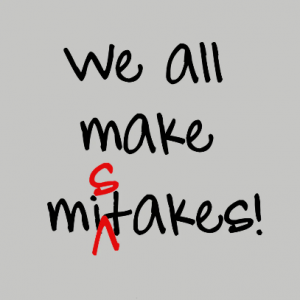
When you are driving your automobile behind another that makes a sudden stop, or an improper turn, which makes you slam on your brakes to avoid an accident, what do you do? Get mad? Send a few choice words or hand gestures their way? Or do you assume the driver made an unintentional mistake and forgive them without frustration?
Or in another scenario, if you are a parent or boss, and someone breaks something, what is your first reaction? What if the item was valuable? Do you assume the act was careless and get angry? Or do you consider the act an accident that anyone could have made, including yourself, and have compassion for the person?
Mistakes happen every day. People have accidents, break things, give incorrect information, do things incorrectly, and don’t do things they should do. Mistakes are part of being imperfect beings in an imperfect world. Yet, we often get upset at people, including ourselves, for making mistakes. At the same time, we are quick to agree with cliches like “mistakes are learning opportunities” and “mistakes are proof you are trying.”
Are our negative reactions to mistakes innate emotional reactions or a reflection of our true thinking that mistakes really aren’t okay? Is our default assumption that people are naturally careless and irresponsible? Maybe we think too highly of ourselves and conveniently forget that we are far from perfect too. In our defense, maybe we just hate to see things not done the best they can be.
If we think logically about mistakes, we probably come to the conclusion that mistakes are unavoidable. That mistakes happen to everyone. And for sure mistakes are part of learning. That we need to better appreciate the value of mistakes. Or at least better assess the reason for the mistake before reacting to it.
Some say that a first-time mistake should be tolerated, but a repeated mistake shouldn’t be. Or if a mistake was truly accidental it should be tolerated, but if something was done carelessly, it shouldn’t be. And most would say if something was done wrong intentionally, it should have consequences.
What is your philosophy on mistakes? When possible, do you encourage people to pursue new ideas and approaches even though something might not work? Or do you limit people to only doing that which is certain? When someone makes a mistake, do you make sure they know it? Maybe even berate them as if they didn’t know they made a mistake already and need to be told they made one?
Is it appropriate for your friends, family, and colleagues to make mistakes? On what basis should mistakes be tolerated? Rewarded? Punished? Do you believe that unintentional first-time mistakes are acceptable? As long as mistakes don’t involve injury or catastrophic losses, do you believe that the learning value of mistakes exceed their cost?
If you prefer certainty and generally avoid trying new ideas, especially when mistakes are likely, consider reframing your philosophies on mistakes. Or if you believe in innovation, but make people feel like failures when they make a mistake, here are a few principles to consider adopting:
- Mistakes are not always the same as failures. Failures are events that don’t achieve a desired outcome. Mistakes are flawed actions or wrong decisions made in the pursuit of an outcome.
- Innovation involves both mistakes and failures. Rarely do new ideas and methods work without issues. They generally involve continued tweaks and trials. If you want to embrace innovation and continuous improvement, embrace mistakes. In some cases, you might even reward mistakes to reinforce creativity over complacency.
- Anything short of perfection is not a mistake. Perfection might be desired, but is generally impossible to achieve. Excellence is a more realistic goal. Regardless, most things don’t need to be perfect. Don’t expect perfection.
- Low-stakes first-time unintentional mistakes made in an attempt to achieve something are okay. These might even be encouraged when the learning value of the mistake exceeds the cost.
- High-stakes first-time unintentional mistakes made in an attempt to achieve something might be okay, but might not be. When risk is high, people need to exercise more care, ask for more help, and take more risk mitigating measures. If you are the boss, parent, or responsible party, you also have a responsibility to see that risk mitigating measures are in place.
- Making the same mistake multiple times is not okay. Someone might legitimately have forgotten the lesson they learned before, but they are responsible for learning from their mistakes. If you are the boss, parent, or responsible party, you don’t own their mistake, but help them pull out the lesson learned so they get it right the next time.
- When a mistake happens, learn from it. Understand what contributed to the mistake with as unbiased a perspective as possible. Understand your role in it and the change in mindset and behavior that is needed going forward.
Article by Mike Hawkins, award-winning author of Activating Your Ambition: A Guide to Coaching the Best Out of Yourself and Others (www.ActivatingYourAmbition.com), author of the SCOPE of Leadership six-book series on coaching leaders to lead as coaches (www.ScopeOfLeadership.com), and president of Alpine Link Corp (www.AlpineLink.com), a boutique consulting firm specializing in leadership development and sales performance improvement. For other articles on reaching your peak potential, visit: www.alpinelink.com/blog
